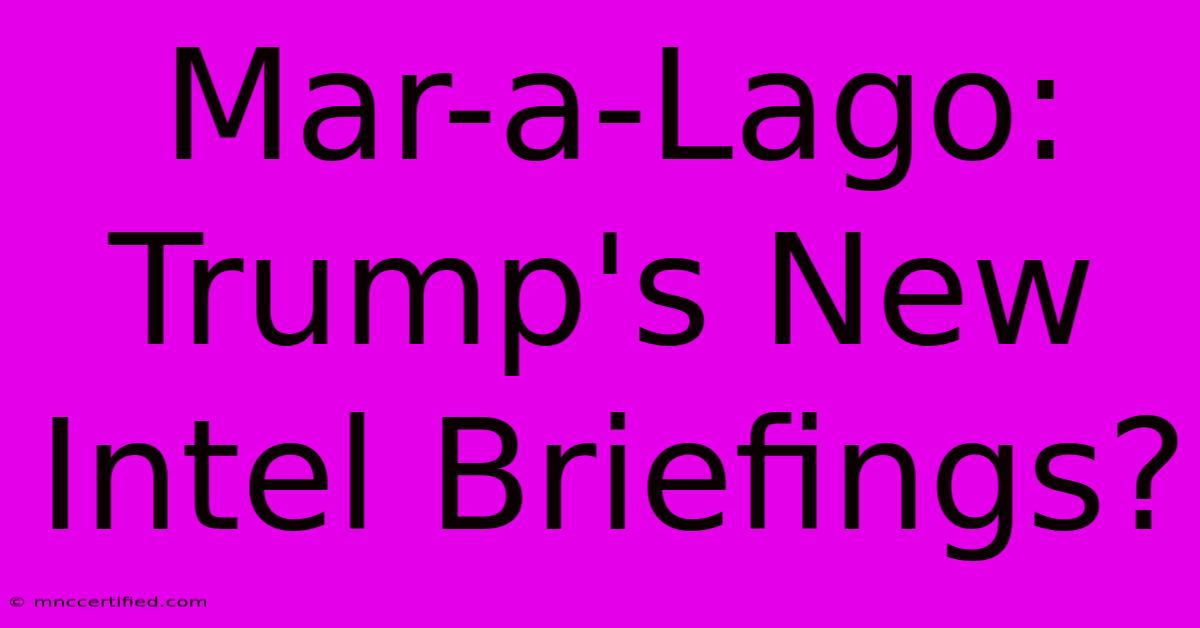Mar-a-Lago: Trump's New Intel Briefings?

Table of Contents
Mar-a-Lago: Trump's New Intel Briefings? A Security Risk or Political Theatre?
The recent discussions surrounding potential intelligence briefings at Mar-a-Lago, Donald Trump's Florida resort, have ignited a firestorm of debate. This article delves into the security concerns, political implications, and historical context surrounding this controversial issue.
Security Concerns: A High-Stakes Gamble?
The primary concern revolves around the security implications of holding sensitive intelligence briefings at Mar-a-Lago. Unlike secure government facilities, Mar-a-Lago is a public resort, frequently hosting a diverse range of guests, including foreign nationals and individuals with varying levels of vetting. This raises serious questions about the potential for information leaks, espionage, and the compromise of national security.
The Vulnerability of Open Spaces
The open nature of Mar-a-Lago presents significant vulnerabilities. Conversations held on the resort's patios, in its restaurants, or even in less-secure areas within the building could be overheard or recorded, potentially exposing classified information. Foreign intelligence agencies, aware of the high-profile individuals frequenting the resort, could easily deploy surveillance techniques.
Personnel Security: A Crucial Factor
The security of personnel attending briefings is another key consideration. While the Secret Service is responsible for protecting the former president, ensuring the safety and security of all those involved in handling classified information requires a robust vetting process exceeding the typical standards of a commercial resort. Background checks and security clearances must be comprehensive and rigorously enforced to prevent potential breaches.
Political Implications: A Calculated Risk or Recklessness?
The political implications of holding briefings at Mar-a-Lago are equally complex. Some see it as a demonstration of Mr. Trump's continued influence and access to information, despite no longer holding office. Others view it as a reckless disregard for national security, potentially jeopardizing sensitive intelligence for political gain.
Public Perception and Trust
The choice of location sends a message about the seriousness with which classified information is treated. Holding briefings in such a public setting could erode public trust in the government's ability to protect sensitive information. The perception of lax security could embolden foreign adversaries and undermine America's standing on the world stage.
Precedent and Future Implications
The precedent set by these potential briefings is significant. If such practices become normalized, it could open the door to future compromises of national security, regardless of who occupies the White House. The potential for abuse of power and political maneuvering cannot be ignored.
Historical Context: Comparing to Past Practices
It's important to contextualize these events within the historical framework of intelligence briefings for former presidents. Past administrations have established procedures and protocols for handling sensitive information, typically within secure government facilities. Deviating from these established practices warrants careful scrutiny and analysis.
The Importance of Established Protocols
The existence of established protocols highlights the importance of adhering to secure practices. These protocols are not arbitrary; they're designed to protect national security and uphold the integrity of the intelligence process. Bypassing these protocols raises concerns about the potential for unforeseen consequences.
Conclusion: Navigating a Complex Issue
The debate surrounding potential intelligence briefings at Mar-a-Lago highlights the tension between maintaining access to information and upholding national security. While former presidents have a legitimate need to stay informed, the location and method of delivering this information must prioritize the protection of sensitive intelligence. A thorough and transparent investigation into the security protocols surrounding such briefings is essential to ensure that the highest standards of national security are maintained. The potential risks involved demand a serious and impartial assessment, one that transcends partisan politics.

Thank you for visiting our website wich cover about Mar-a-Lago: Trump's New Intel Briefings?. We hope the information provided has been useful to you. Feel free to contact us if you have any questions or need further assistance. See you next time and dont miss to bookmark.
Featured Posts
-
Blair Leads Tributes To Prescott
Nov 22, 2024
-
Laos Methanol Poisoning Kills Five Injures Two
Nov 22, 2024
-
E Coli Outbreak Full Ground Beef Recall List
Nov 22, 2024
-
K12 Student Insurance Miami Dade
Nov 22, 2024
-
Car Insurance For Impounded Cars
Nov 22, 2024